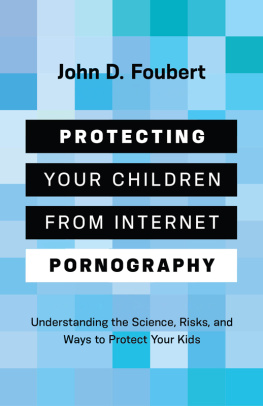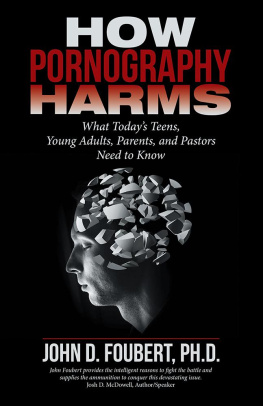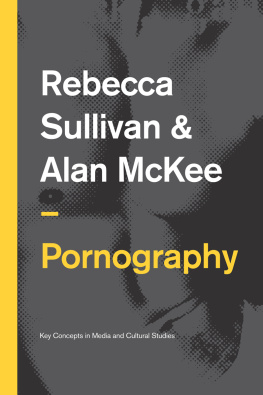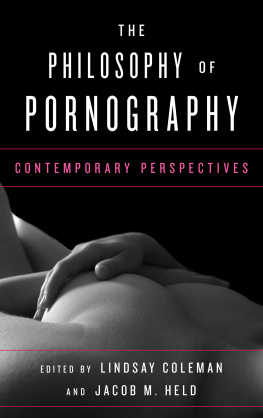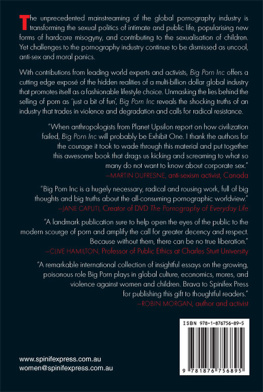There are many individuals whom I would like to thank for their help and encouragement in the writing of this book. First my wife, Donna, who during a rush hour trip to her parents with the kids asleep in the van challenged me to offer a course on men and addictions at Wheaton College. Second, those at InterVarsity Press and InterVarsity Christian Fellowship who have helped me along the way: my editor, Al Hsu, who provided me with keen insight and feedback, and Roger Anderson, who arranged for the pornography workshop and speaking opportunities to share what men needed to hear. And finally my friends, students and colleagues who took time to help me proof chapters and let me bounce ideas off of them. You know who you are, and I am humbled by your encouragement.
8

Rewiring and Sanctification
We are embodied and embedded at a number of levelsphysical, psychological, social and spiritual. We are made as Gods agents in this world for his pleasure and for our own. We are made for each other, to be present and relational with one another. When we better understand who we are as human beings made in the image of God, we see better our created nature. We are made to be conformed to the image of Christ, to be sanctified. That process begins in this life. The decisions we make now affect the ongoing process of neural rewiring, our emotional state, our behavior, our embodied soul. As we think on the things that are good, noble and right we are becoming something: sanctified, conformed to the image of Christ.
Knowledge about our biological nature is not an excuse for sin. My brain made me do it or Porn has messed up my brain so I cant help myself are not get-out-of-jail-free cards. We are still responsible for our actions. As a man cultivates patterns of depravity, he diminishes his ability to bear Gods image rightly. The knowledge that we get from Scripture and science should not be used to deny, justify, rationalize, minimize, normalize or celebrate the exercising of brokenness. It should be used to show compassion for those who have been propelled by the needs and design of their created nature down the path of depravity.
Rather than blame the needs, we should look at the process by which these needs drove us to depravity. These very same needs, however, can be reclaimed and redirected to travel the path of sanctification and holiness. Rather than resign ourselves to view our sexual nature as an impediment in the journey toward holiness, our sexuality should be reframed as a principal driving force toward sanctification. Rather than denigrate the neurobiological rooting of our psychological experience, we should use this knowledge about how we neurologically form emotional attachments as a necessary part of the process of sanctification.
How does a man become addicted to holiness? How does he cultivate his embodied nature to embrace sanctification? Many of the principles that govern all of spiritual formation have their impact in the brain. We can reframe recovery from pornography, sex addictions and compulsions as a process of rewiring, redemption and sanctification.
Many practical details about recovery from pornography addiction and sexual compulsion can be found elsewhere in books written by clinical psychologists, recovering addicts and counseling experts (see Appendix A for a list of online resources). In lieu of reinventing the recovery wheel, I defer to the texts I have cited in this book and the resources in Appendixes A and B as starting points for practical matters of recovery. What is critical, however, is understanding that the recovery of thought is rooted in the embodied brain and designed for the process of sanctification. As a result, it is a matter of spiritual formation.
Recovery as Spiritual Formation
We must open our eyes to see how God has been at work in us. Once we understand how we are made, we must support each other in a spirit of compassion and forgiveness. Every man who struggles with pornography needs wisdom from other men (and women) who can provide insight, comfort, strength and encouragement. The need will be great, especially at the beginning of the recovery and redemption processes. Neurological troughs of depravity are rarely changed overnight, since they were not formed overnight. The burden will be heavy, but we must serve the man who is repentant because he bears the image of God. By listening, offering insight into root problems, correcting false thoughts and lies, reminding them of their created nature and helping to illumine the true nature of Gods love for us all, we provide the support that is needed to change course.
We are meant to live in a worthy way, and that way is not traveled alone. Men must be called to account regularly and rebuked in love when necessary. Correction is not to be feared but sought out by the man who longs to become holy and good. The challenge of accountability must always be rooted in a spirit of grace and focused on behavior. To condemn someone who is in the midst of a shame cycle only makes matters worse. If they are unable to hear that they have value as a child of God, they cannot progress toward recovery. The emphasis should be on changing the behavior.
We should help each other to envision the unique way that each of us will be conformed to the image of Christ. As we help each other prepare for the realities of our day, we must also have dreams about how God will use our unique experience, gifts and passions within the body of Christ to manifest his love in this world. Without being overly idealistic, dreams for marriage, work, family and ministry should be encouraged and empowered. By recognizing that each person will have their own unique journey and place in the body of Christ, we honor them. We can move beyond trying to fit any preconceived notions of what they should have been if they had only avoided their sin, and recognize that God can still demonstrate his love for them in a unique way. This path of confession, enlightenment, encouragement, challenge and vision respects the process of spiritual formation in the life of a man imprisoned by pornography, as well as everyone else.
Confession
The first step that a man can take to free himself from the prison of pornography (or any other sexual sin) is to confess. Confession moves beyond denial, minimization, normalization, justification and ration-alization to a right understanding of ones own brokenness. It refuses to celebrate and revel in the sin, and is the first step toward reestablishing communion with God and others. Because pornography has such an isolating effect on men who are intent on hiding their problem, it is important that this confession be more than between him and God. By confessing to another person, the isolating effect that porn has on a man will be reduced. When sin is shared with another person, a man is forced to expose his brokenness. How a man exposes this brokenness, however, is critical in the healing process. Only with a repentant heart that is completely broken can a man begin the process of true recovery.
Many men confess if they are caught, but they may not be repentant. They may feel guilty, but they may not be truly repentant. The measure by which a man can recover from a pornography problem is equal to his willingness to do the things that evidence repentance. If he tries to minimize, normalize, justify or rationalize, true healing will be slow and unlikely. He must be completely broken, as King David was when confronted by the prophet Nathan (2 Sam 12), in order to be restored. The consequences may not disappear, but he must be prepared to live with them and do what is necessary to make amends. It is essential that a man come to a true place of brokenness on this path. If he does not acknowledge his need for God, it is difficult for him to make any lasting progress in his recovery.


